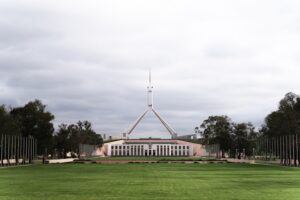
MILWAUKEE, WISCONSIN - JULY 14: Turning Point USA Founder Charlie Kirk is seen onstage at the Fiserv Forum during preparations for the Republican National Convention (RNC) on July 14, 2024, in Milwaukee, Wisconsin. Delegates, politicians, and the Republican faithful are arriving in Milwaukee for the annual convention, concluding with former President Donald Trump accepting his party's presidential nomination. The RNC takes place from July 15-18. (Photo by Andrew Harnik/Getty Images)
On March 15, 2024, prominent activist Charlie Kirk was tragically murdered while speaking at a university in Utah. The shocking incident occurred in front of his wife and two young children, marking a significant escalation in political violence and raising urgent questions about the state of public discourse.
As the world grapples with increasing tensions, the atmosphere surrounding political discussions has grown increasingly hostile. Recent incidents illustrate a disturbing trend where violent rhetoric has begun to manifest in real-world actions. In one case, Luigi Mangione, a 26-year-old with grievances against the healthcare system, stands accused of murdering the CEO of UnitedHealthcare in New York. Meanwhile, Elias Rodriguez, a 30-year-old activist from Chicago, is awaiting trial for allegedly killing two Israeli embassy staffers while proclaiming “Free Palestine” in Washington D.C.. In another violent act, Thomas Matthew Crooks, a 20-year-old from Pennsylvania, attempted to assassinate former President Donald Trump at a rally, resulting in the injury of three individuals and the death of one bystander.
The chilling murder of Kirk serves as a grim reminder of how public debate has devolved into an arena where disagreement can lead to deadly consequences. The ability to engage in respectful discourse is diminishing, replaced by a climate where anger and violence dominate. Observers note that in previous generations, particularly after the Second World War, discussions were often framed in stark moral terms, allowing for a more principled approach to debate.
The cultural shifts observed in recent years have seen the rise of relativism over principled discussions. Populist slogans often substitute for meaningful national identity, while antisemitism re-emerges under guises like “Free Palestine.” Such toxic ideas thrive when society undervalues the importance of disagreement and dialogue.
In light of Kirk’s death, it is essential to reflect on the words he shared before his murder: “…find our disagreements respectfully, because when people stop talking, that’s when violence happens.” His assassination underscores a reality that society is already confronting, where the absence of dialogue can lead to tragic outcomes.
The implications of this incident extend beyond the loss of a life; they challenge the very foundation of free speech. The international outcry following the 2015 Charlie Hebdo attacks, encapsulated in the phrase “Je suis Charlie,” emphasized unity against violence and support for free expression. Today, that sentiment resonates with renewed urgency as the world reflects on the tragic murder of a man dedicated to public discourse and activism.
As the investigation into Kirk’s death unfolds, society must grapple with the question of what comes next. The consequences of failing to engage in respectful debate could lead to further violence, highlighting the critical need for dialogue in a time when disagreements often spiral into aggression. The world must remember that the rejection of violence in favor of conversation is not just a lofty ideal; it is essential for preserving the democratic principles upon which many societies are built.







